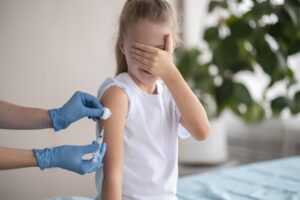Information on the measles, mumps and rubella vaccines
Every day, we in the paediatric outpatient clinic receive questions from concerned relatives about the measles-mumps-rubella vaccination. Measles, mumps and rubella are viral diseases of children and adolescents, but they can also affect unprotected adults.
Die Dreifach-Kombinationsimpfung gegen Maser Mumps und Röteln (MMR) ist im kostenfreien Impfprogramm enthalten. Es handelt sich um eine Lebendimpfung. Es werden zwei MMR-Impfungen ab dem vollendeten 9. Lebensmonat (unbedingt vor Eintritt in Gemeinschaftseinrichtungen) empfohlen.
- In case of first vaccination in the 1st year of life (from the completed 9th month of life), the 2nd vaccination should be administered after three months.
- In case of first vaccination after the 1st year of life, the 2nd vaccination is given as early as possible, with a minimum interval of four weeks.
- Missing MMR vaccinations can and should be made up at any age.
Definition einer MMR (Masern, Mumps und Röteln) – Infektion
Masern und Mumps sind ansteckende Viruserkrankungen für Menschen. Diese sind weltweit verbreitet. Bei beiden Infektionskrankheiten können sowohl bei Kindern, Jugendlichen und Erwachsenen schwere Komplikationen und Folgeerkrankungen auftreten. Bei Röteln handelt es sich um eine Infektionskrankheit, die oft ohne Symptome verläuft. Eine Rötelinfektion in der Schwangerschaft kann jedoch schwere Schädigungen des ungeborenen Kindes auslösen. Die Dreifach-Kombinationsimpfung Masern Mumps und Röteln (MMR) schützt vor diesen Infektionskrankheiten. Bei Kleinkindern und Erwachsenen besteht ein besonderes Risiko für einen schweren Verlauf. Die Masern-Viren werden durch Tröpfcheninfektion oder durch direkten Kontakt mit infektiösen Nasen-/Rachensekret übertragen. Die Inkubationszeit beträgt durchschnittlich acht bis zehn Tage. Mumps ist eine infektiöse Viruserkrankung, die durch das Mumpsvirus verursacht wird.
Symptome MMR (Masern Mumps und Röteln) Infektion
Complications of measles infection are:
- Otitis media
- Pneumonia (measles pneumonia)
- Seizures and inflammation of the brain (encephalitis)
These can also be fatal. In addition, measles causes an increased risk of dying from other infectious diseases for several years due to weakening of the immune system.
Complications of mumps that increase with age:
- Neurological disorders such as paralysis, dizziness, speech disorders and personality changes, headaches, wandering pain in different parts of the body. Symptoms of increased intracranial pressure, such as nausea or vomiting.
- Meningitis (inflammation of the brain)
- Inflammation of the brain (encephalitis)
- Inflammation of the nerves in the ear area which can later lead to deafness (acoustic neuroma).
- Testicular inflammation Infertility (infertility)
- Inflammation of the pancreas (pancreatitis)
Complications of viral infection with rubella:
- Characteristic small-spotted redness exanthema
- Swelling of the lymph nodes (especially in the neck)
- Joint complaints
- Increased risk of malformations of the embryo and premature births









